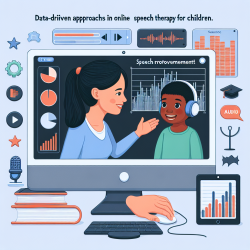Introduction
In the realm of speech-language pathology, data-driven decision-making is crucial for creating effective therapy plans that yield positive outcomes for children. At TinyEYE, we are dedicated to using empirical evidence and comprehensive data analysis to guide our online therapy services for schools. This blog will explore how data-driven approaches enhance the effectiveness of speech therapy and ultimately lead to better outcomes for children.
The Importance of Data in Speech Therapy
Data collection and analysis play a pivotal role in speech-language pathology. By systematically gathering and interpreting data, therapists can:
- Identify specific areas of need for each child
- Track progress over time
- Adjust therapy plans based on measurable outcomes
- Ensure that interventions are evidence-based
Data-Driven Strategies at TinyEYE
At TinyEYE, we implement several data-driven strategies to optimize our online therapy services:
- Initial Assessments: Comprehensive assessments at the start of therapy help us understand each child's unique needs and set baseline measurements.
- Progress Monitoring: Regular data collection during therapy sessions allows us to monitor progress and make necessary adjustments in real-time.
- Outcome Measurement: We use standardized tools to measure outcomes and ensure that our interventions are effective.
- Data Analysis: Advanced data analysis techniques help us identify trends and patterns that inform our therapy practices.
Case Study: Success Through Data-Driven Therapy
Consider the case of a young student named Emily who struggled with articulation. By leveraging data-driven approaches, TinyEYE therapists were able to:
- Conduct a detailed initial assessment to identify Emily's specific articulation issues
- Set measurable goals based on her assessment results
- Track her progress using data collected during each session
- Adjust her therapy plan based on data analysis, ensuring targeted and effective interventions
- Achieve significant improvements in Emily's articulation within a few months
This case study exemplifies how data-driven decisions can lead to substantial improvements in speech therapy outcomes.
The Role of Technology in Data-Driven Therapy
Technology plays a crucial role in facilitating data-driven approaches in online speech therapy. TinyEYE utilizes advanced software and tools to:
- Streamline data collection and analysis
- Provide real-time feedback to therapists and students
- Enable remote monitoring and adjustments to therapy plans
- Enhance communication and collaboration between therapists, students, and their families
Conclusion
Data-driven decision-making is integral to the success of speech therapy interventions. At TinyEYE, we are committed to using data to guide our therapy practices and ensure the best possible outcomes for children. By continuously collecting, analyzing, and acting on data, we can create personalized and effective therapy plans that help children achieve their communication goals.
For more information on our data-driven approaches and online therapy services, visit our website or contact us today.










